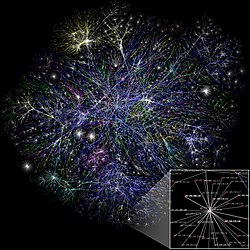
Back شبكة معقدة Arabic Komplexes Netzwerk German Red compleja Spanish شبکه پیچیده Persian Réseau complexe French רשת מורכבת HE Komplex hálózat Hungarian 複雑ネットワーク Japanese व्यामिश्र जाल Marathi Complexe netwerken Dutch
| Part of a series on | ||||
| Network science | ||||
|---|---|---|---|---|
| Network types | ||||
| Graphs | ||||
|
||||
| Models | ||||
|
||||
| ||||
In the context of network theory, a complex network is a graph (network) with non-trivial topological features—features that do not occur in simple networks such as lattices or random graphs but often occur in networks representing real systems. The study of complex networks is a young and active area of scientific research[1][2] (since 2000) inspired largely by empirical findings of real-world networks such as computer networks, biological networks, technological networks, brain networks,[3][4][5] climate networks and social networks.
- ^ R. Albert and A.-L. Barabási (2002). "Statistical mechanics of complex networks". Reviews of Modern Physics. 74 (1): 47–49. arXiv:cond-mat/0106096. Bibcode:2002RvMP...74...47A. doi:10.1103/RevModPhys.74.47. S2CID 60545.
- ^ Mark Newman (2010). Networks: An Introduction. Oxford University Press. ISBN 978-0-19-920665-0.
- ^ Bassett, Danielle S; Sporns, Olaf (2017-02-23). "Network neuroscience". Nature Neuroscience. 20 (3): 353–364. doi:10.1038/nn.4502. ISSN 1097-6256. PMC 5485642. PMID 28230844.
- ^ Alex Fornito. "An Introduction to Network Neuroscience: How to build, model, and analyse connectomes - 0800-10:00 | OHBM". pathlms.com. Retrieved 2020-03-11.
- ^ Saberi M, Khosrowabadi R, Khatibi A, Misic B, Jafari G (January 2021). "Topological impact of negative links on the stability of resting-state brain network". Scientific Reports. 11 (1): 2176. Bibcode:2021NatSR..11.2176S. doi:10.1038/s41598-021-81767-7. PMC 7838299. PMID 33500525.
